By KATIE EUBANKS
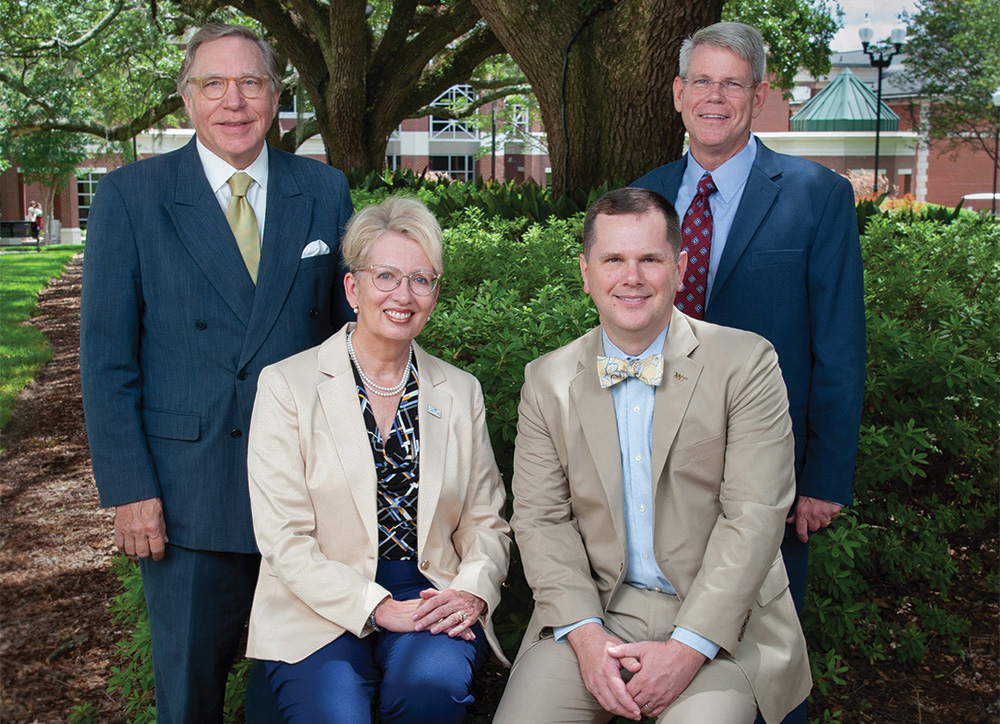
From left: Belhaven University President Dr. Roger Parrott, Blue Mountain College President Dr. Barbara McMillin, Mississippi College President Dr. Blake Thompson, and William Cary University President Dr. Ben Burnett.
Last month, MCL Editor Katie Eubanks interviewed four presidents of Christ-centered institutions of higher learning in Mississippi. Two themes emerged from these conversations: the sense of community at smaller, faith-based schools, and the importance of Christian higher education! Remarks have been edited for clarity and space.
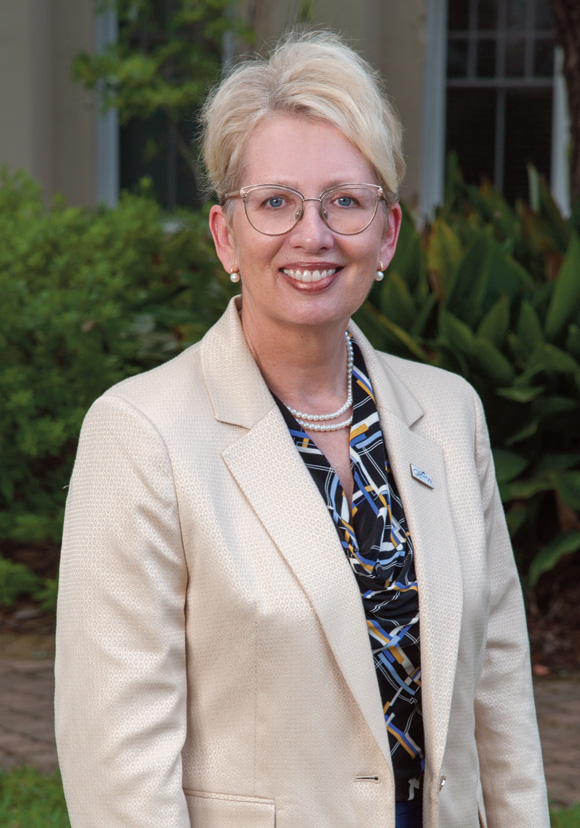
Dr. Barbara McMillin, Blue Mountain College
Dr. McMillin grew up in Falkner in northeast Mississippi, just a short drive from Blue Mountain. She earned her doctorate at The University of Mississippi and taught English at Northeast Mississippi Community College before joining the faculty at Union University. During her 20-year tenure at Union, she became chair of the English department, dean of the College of Arts and Sciences, and was later promoted to associate provost and dean of instruction.
In her role as a college president, Dr. McMillin uses her passion for teaching to encourage and enable others who have been called to teach.
Blue Mountain College was founded in 1873 as a women’s institution, opened its doors to men who were called to ministry in the 1950s, and in 2005 became fully co-educational. (The ladies still outnumber the men a little, but “the guys have caught up,” Dr. McMillin says.) Renowned for the exceptional caliber of its teacher education graduates, Blue Mountain likewise enjoys an outstanding reputation for graduates engaged in Christian ministry. Affiliated with the Mississippi Baptist Convention, the college recently gained Stage II approval from Mississippi Institutions of Higher Learning to begin a nursing school.
What she loves about Blue Mountain:
There truly is a sense of family. We’re a very small institution, just over 100 or so employees. Everyone knows everyone else. We all eat in the dining hall at lunch.
If I had to reduce it to a word, it would be, it is a genuine community. It just feels so real. Students tell us this, too.
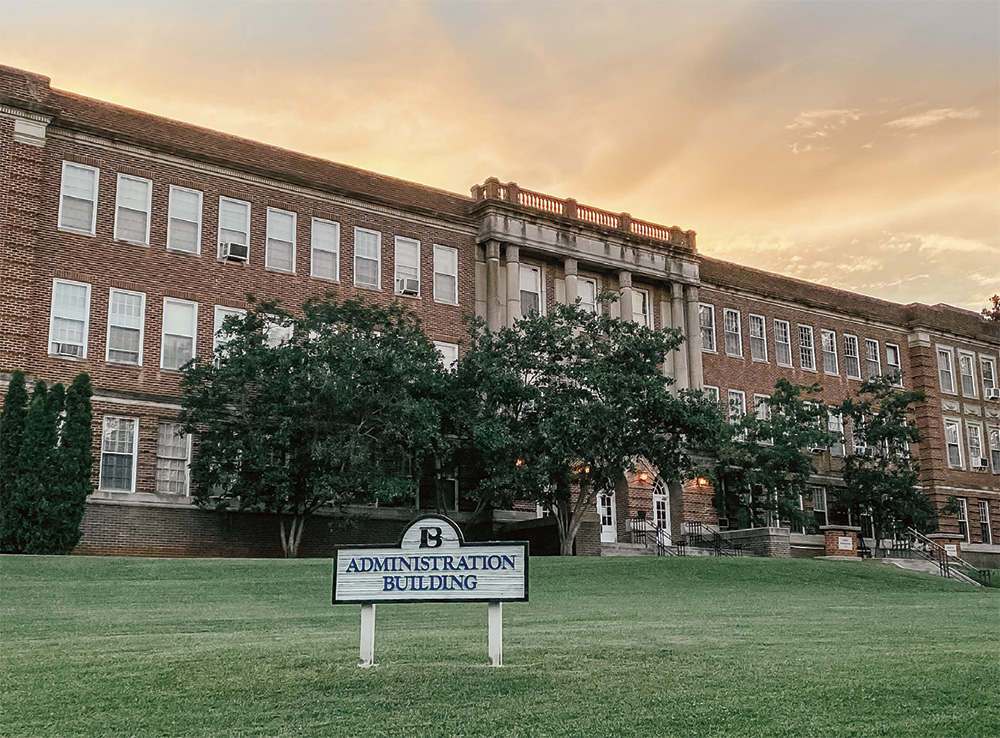
Blue Mountain’s administration building.
What makes Blue Mountain different?
I have the opportunity every day to encourage faculty (to) teach from a Christian perspective, showing students what it means to think Christianly — and I feel very passionately about teaching Christianly.
Christian parents, Christian grandparents, need to think about what their young person is going to learn about any (subject) — does it look different if you look at it through the eyes of faith? And the answer is yes. We don’t want people to miss that. It makes a difference.
The impact of COVID:
For the last two years, we have started (classes) under constraints. We don’t feel that (now). We’re really challenging faculty … What are the things you wanted to achieve, what constitutes academic excellence, maybe that you’ve always dreamed of, but the circumstances (in 2020 and 2021) didn’t give you the opportunity?
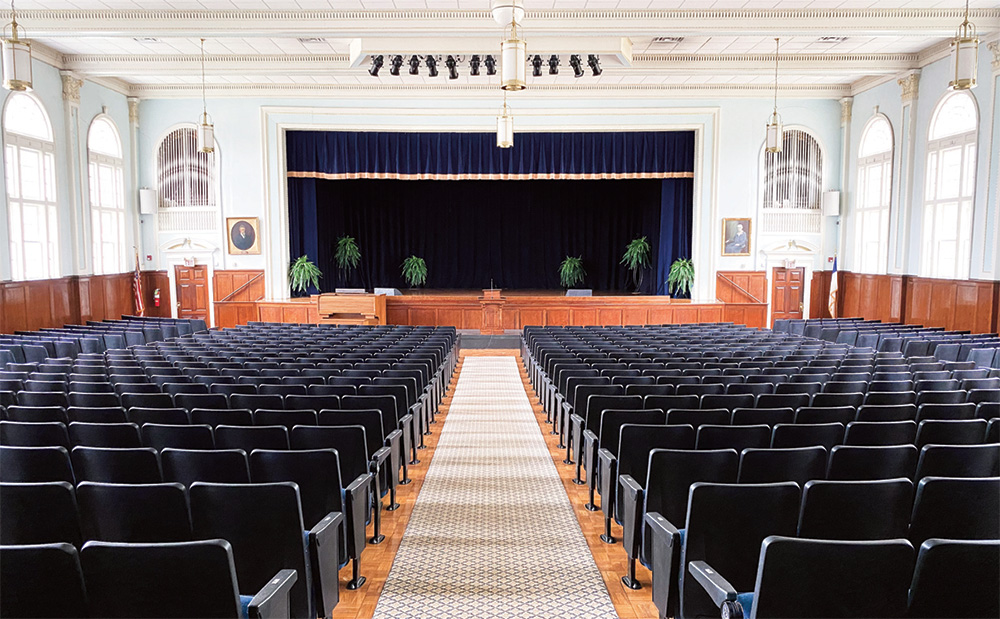
The Modena Lowrey Berry Auditorium at Blue Mountain College.
What she’s learned at Blue Mountain:
A high view of God is the solution to a thousand problems, I think is the way (A.W. Tozer) says it. … I have seen things happen that are God-only moments throughout 10 years at Blue Mountain.
The need for Christian higher education has never been greater … The opportunity before us to be faithful, and to see what God can do through that faithfulness, is what keeps me going.
We’re not going to be less of who we are — we’re going to be more of who we are.
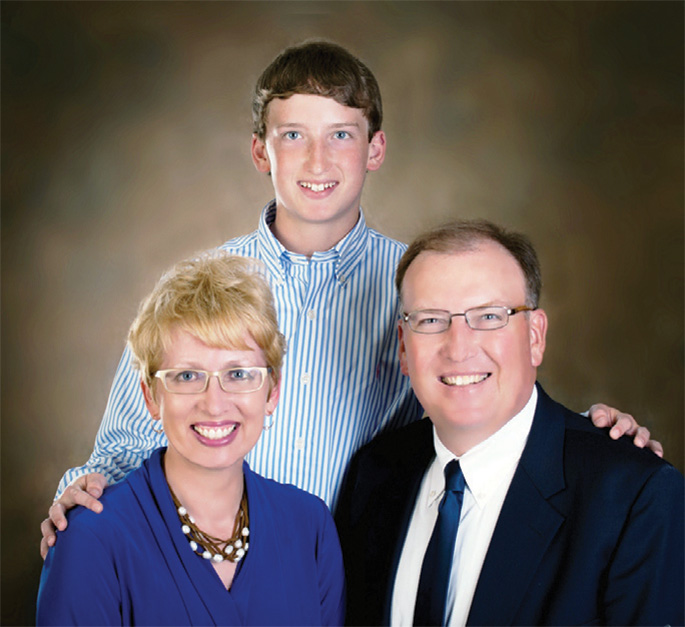
Dr. McMillin with her husband, Larry, and son, Sam.
How Christian higher ed is changing:
Think about the international students that join the mix here. … We have students who may be very mature in their faith, (and) at the same time you’ve got a student coming who maybe has never been in a (Christian) worship service.
How we consistently meet the needs of the student who is more mature on that spectrum when we also want to spiritually minister to students who aren’t there yet — we’ve got to think about how to do that.
(There are also the) the questions of religious liberty and the impacts that could happen … We’ve got to be mindful of what we must be ready to do to exist in a culture that does not want to support us.
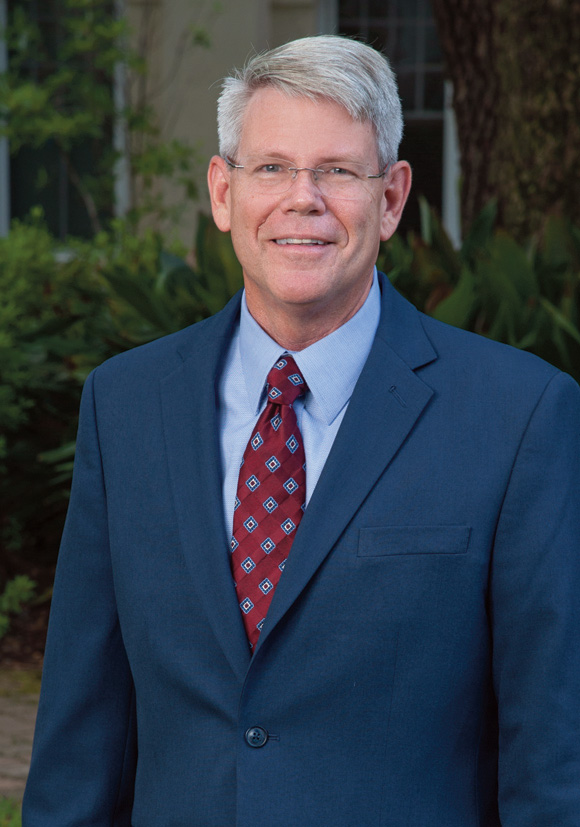
Dr. Ben Burnett, William Carey University
Dr. Burnett grew up in the Hattiesburg area and worked for the Lamar County School District for 26 years — as a high-school band director, middle-school principal, and superintendent. Along the way, he became an adjunct instructor in the School of Education at William Carey University in Hattiesburg. He became William Carey’s dean of education in 2014, executive vice president in 2021, and president just last month, after former president Dr. Tommy King retired.
William Carey was founded in 1892. Approximately 5,300 to 5,400 students attend the school, including 1,000 at the Biloxi campus and 100 at the nursing site in Baton Rouge. Nursing, biology, business administration, elementary education, and psychology are some of the school’s most popular degree programs. William Carey is affiliated with the Mississippi Baptist Convention. As the namesake of the Father of Modern Missions, the Carey family seeks always to “Expect great things from God; attempt great things for God.”
What he loves about William Carey:
The atmosphere of the campus is what drew me. And I really wish I had come here sooner. (In the education department) I got to work with so many other great superintendents and principals … that have just become my dearest friends.
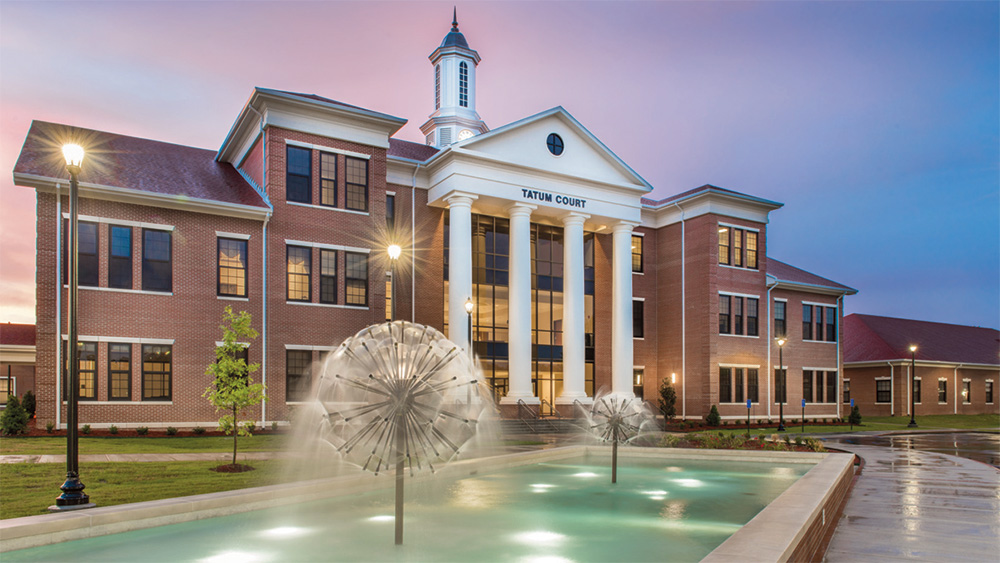
William Carey’s administrative complex, Tatum Court, was rebuilt after being destroyed by an EF3 tornado in January 2017.
What makes William Carey different?
(It’s) a personalized experience. (Half) of our staff and a lot of our faculty (are alumni who) never left Carey. Some of them have been there 30-something years.
The challenge is, we’re not all that small. (We’re) kind of like a very large church with satellite campuses, and all of a sudden you’ve got to find ways to get connected through small groups and things like that that big churches do to make it feel small. So we’re trying to do that.
We try to embrace parents as much as we can … next Thursday we’re welcoming new students in, and we’ll do a parent meeting. And that’s easier to do on campuses like ours.
The impact of COVID:
We’ve realized that we can call a quick meeting with everybody and not get everybody in one place.
And I still teach, in the educational leadership program. (One of my classes converted) to virtual meetings and we’ve kept them that way. Because our students are all teachers, coaches — and to be able to hop on (to a video class) on a Saturday morning, it’s actually a good time for them.
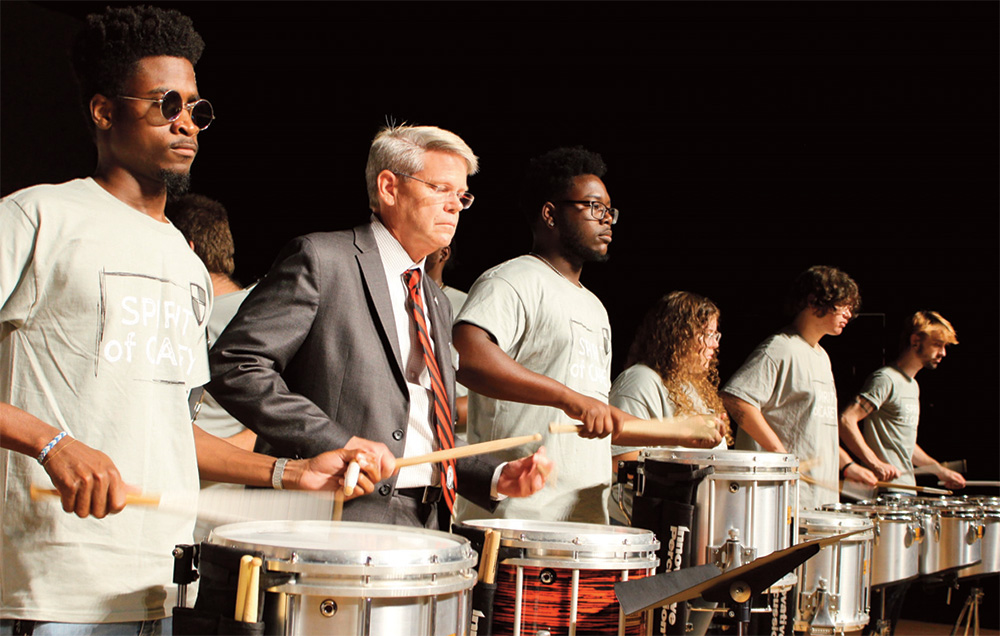
Dr. Burnett, who drums in the praise band at his church, joins the drumline at a faculty-staff assembly.
What he’s learned at William Carey:
My board president sent me a link this morning (to an article titled) ‘Is College Worth the Cost? 85% of Gen Z student loan borrowers would have done something different.’ So people are changing their view of, do I need higher education? Can I afford higher education? So we’ve got some challenges.
Our task for keeping Christian higher education on the forefront is more important now because (the) world is moving, but we can’t be like a little sailboat. We’ve got to be like a tugboat, a steam liner in the middle of the ocean, staying our course.
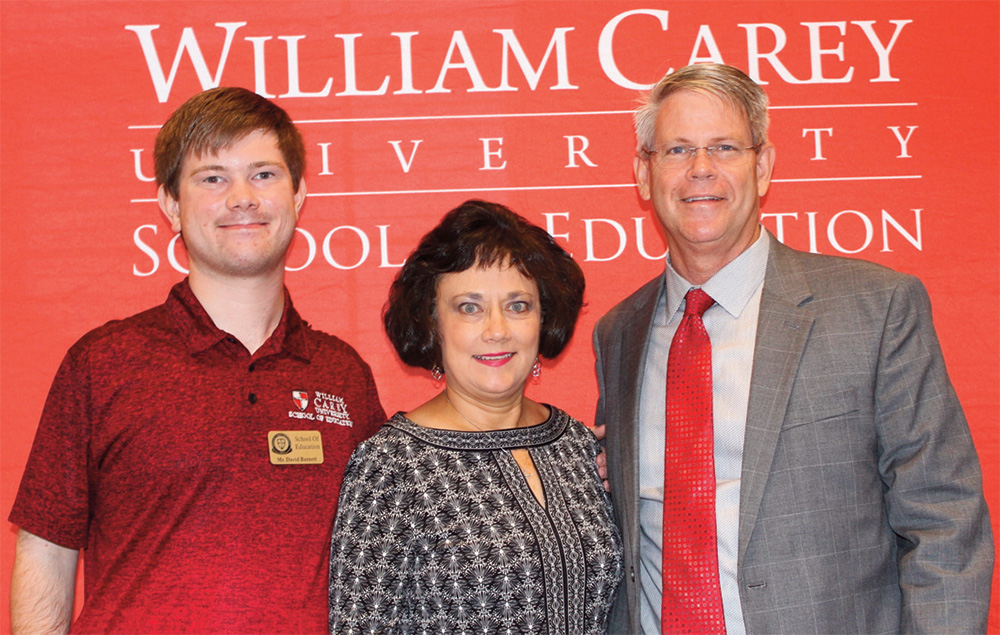
Dr. Burnett with his wife, Denice, and son, David, both of whom graduated from William Carey.
How Christian higher ed is changing:
We don’t just attract students who are on fire for the gospel. (Our campus is) not just a haven for people who believe, but a mission field to draw others in to where we can show them the love of Christ. So we’ve just got to make sure we’re loving everybody.
So I’m going to stand in front of the students at convocation in two weeks (and say), on this campus, we’re going to show the love of Christ, wherever you are in your journey, and you may not even be a believer.
That doesn’t mean we condone things that we don’t stand for or agree with, but we love everyone.
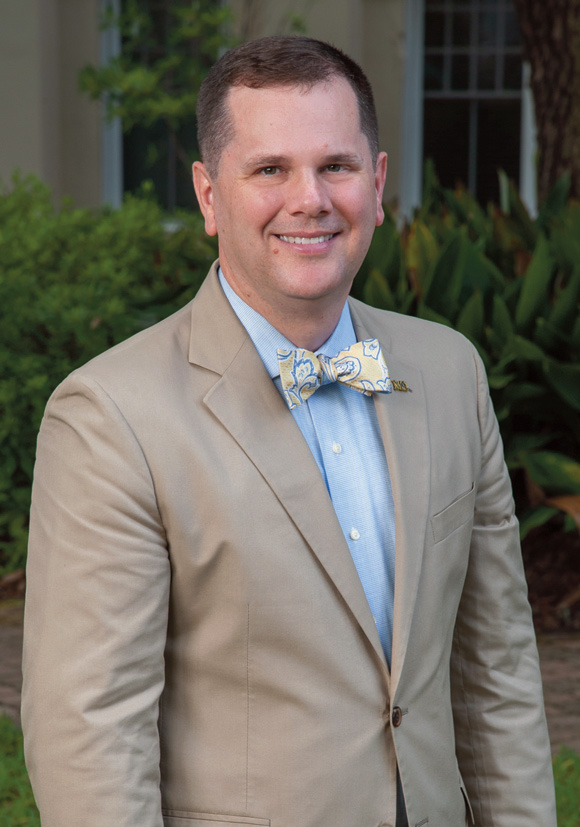
Dr. Blake Thompson, Mississippi College
Dr. Thompson grew up in northeast Mississippi, earned a doctorate of pharmaceutical sciences at The University of Mississippi, and applied what he learned in the healthcare world to the policy world in Washington D.C., where he served as a senior staffer for the U.S. Senate Appropriations Committee and the late Sen. Thad Cochran. Dr. Thompson later served as vice president and secretary to the Ohio State University Board of Trustees, and had a joint vice-presidential appointment with Battelle, the world’s leading nonprofit research and development organization. He returned to Mississippi in 2018 to become the 20th president of Mississippi College in Clinton.
Founded in 1826, Mississippi College is the oldest institution of higher learning in Mississippi. Just under 5,000 undergraduate, graduate and law students attend the university. MC offers more than 80 undergraduate majors, more than 50 graduate areas of study, three doctoral programs, a law school, and one of the state’s finest physician assistant programs. Affiliated with the Mississippi Baptist Convention, MC is a Christian university known for academic excellence and commitment to the cause of Christ.
What he loves about MC:
One of my first visits outside of the state (when I became president was) with an older (alumnus) who told me that he had just within the last year or so been diagnosed with cancer. And the first three people that he called and asked to pray for him were his three suitemates (from) Mississippi College.
I’ve not heard that level of long-term commitment and relationship at other places, at other kinds of institutions — not just higher-ed institutions.
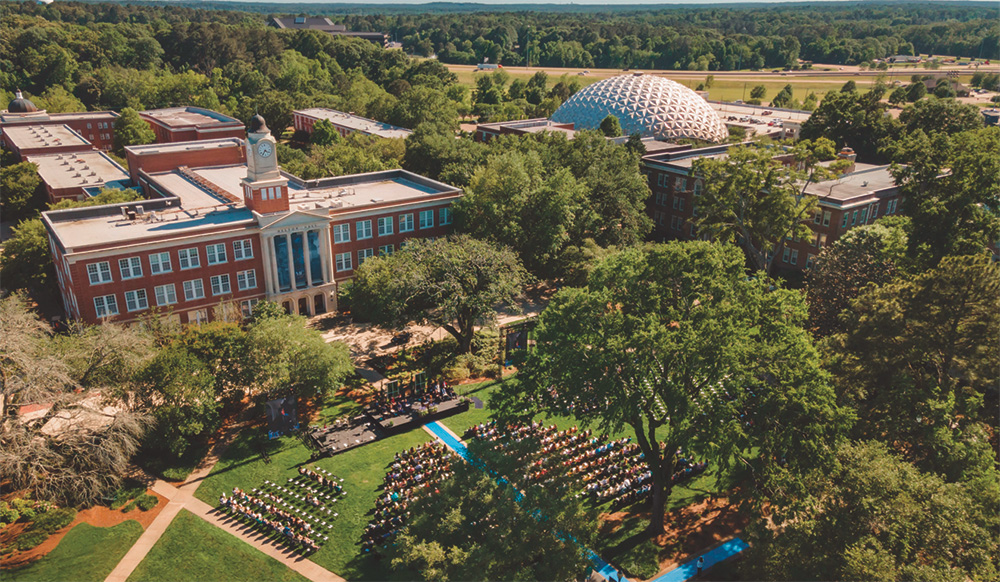
An aerial view of Mississippi College.
What makes MC different?
We had a long-serving trustee whom we lost in the last couple of years. And in my last conversation with him, he made the point to me that in an increasingly secular, pluralistic society, that having different offerings is incredibly important. And that perhaps private, faith-based institutions are more important than they’ve ever been.
At the same time, we can offer a world-class education. And (we) do those two things in a community, a feeling of family. We also have a beautiful campus.
The impact of COVID:
At our spring 2021 commencement, I was advised not to shake hands. (So) I hugged every student as I gave them their diploma. Remarkably, we made it out without any issues.
I haven’t been as active (on social media) during COVID as I would be in normal time. And I will likely become more active as we get back to normal. … I didn’t want to be doing things on social media that I wouldn’t have been doing in person.
I’m proud of the way we’ve worked together and relied on each other through COVID at the Mississippi Association of Independent Colleges and Universities.
I get the chance to lead that organization as its volunteer president. … I’ve got to say something about Harold Fisher, who (served as executive secretary-treasurer) for decades. And Dr. Tommy King of William Carey was president before me. (MAICU has) given us an incredible platform for collaboration.
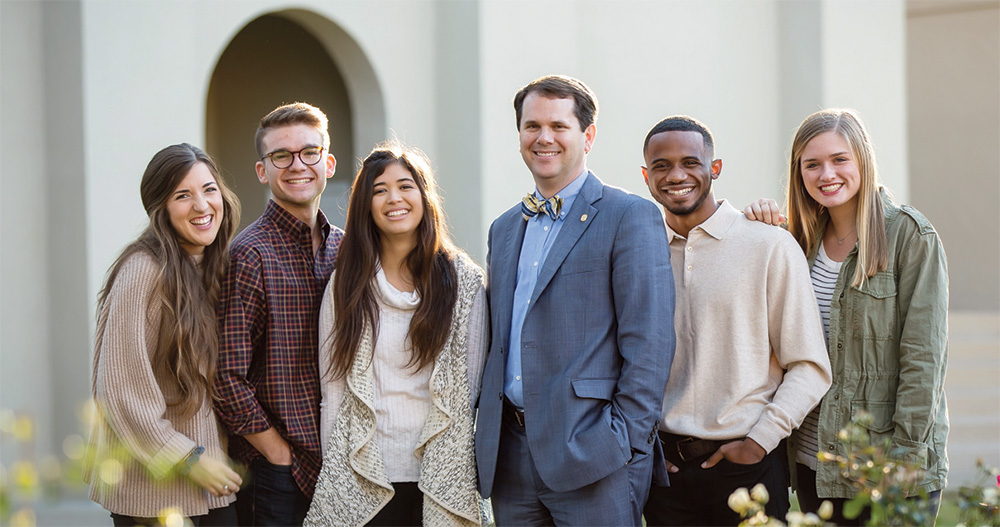
Dr. Thompson with MC students
What he’s learned at MC:
What I’ve found is (MC) is a great fit for me. It’s smaller, more community oriented. I get to interact with students, faculty and staff, and community members directly. I can build real, lasting relationships with people over time.
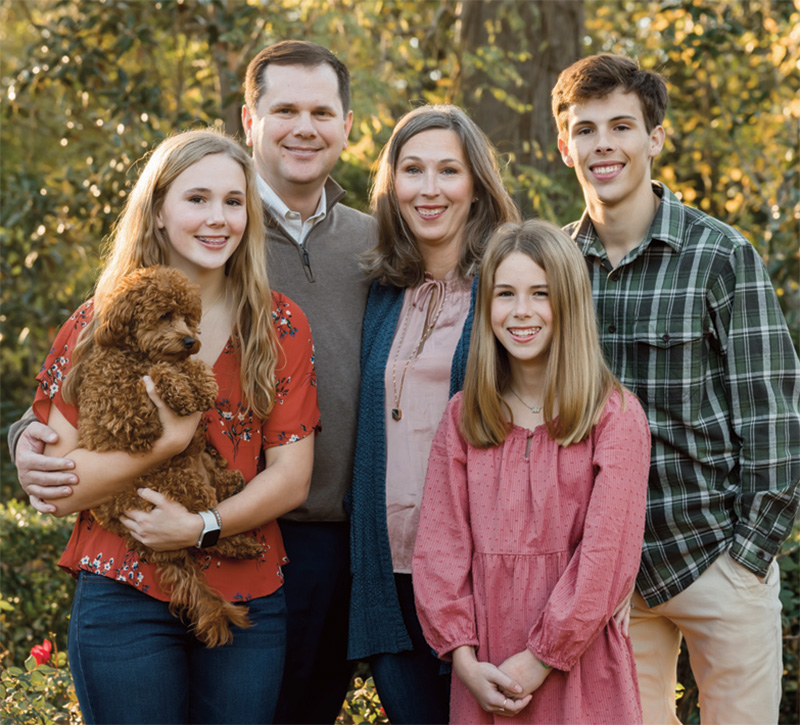
From left: Sarah Blake holding Millie Catherine, aka “MC”; Dr. Thompson, Jana, Cate and Grey Thompson.
How Christian higher ed is changing:
I think as Christian educational institutions, our priority is to remain committed to those principles and values that our institutions were founded on.
In a world where values are shifting, (we must) remain true to the set of values we were given — by God and by faith-based leaders over generations.
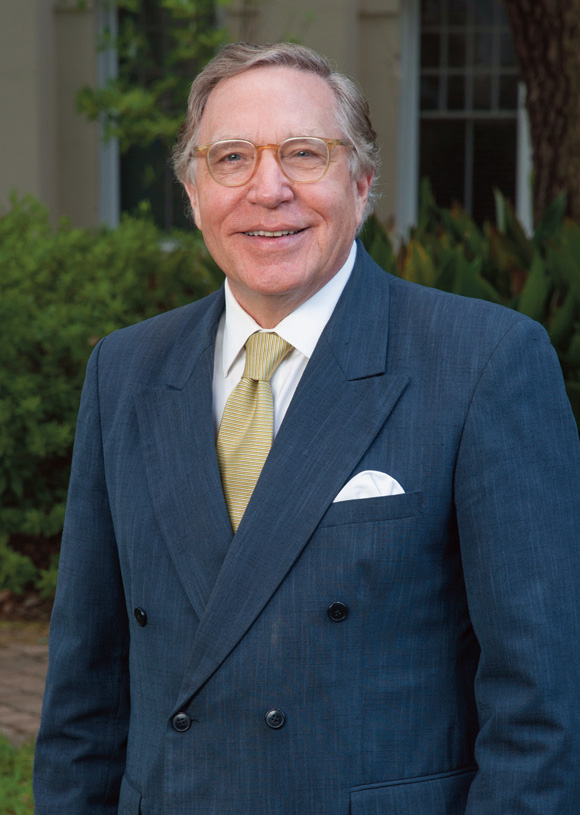
Dr. Roger Parrott, Belhaven University
Dr. Parrott was a pastor, college administrator, and U.S. director of a missions organization before following in the footsteps of his father and grandfather, who were both college presidents. He was one of America’s youngest college presidents, first elected at age 34. He has served on various boards and was chair of the 2004 Forum for World Evangelization hosted by the Lausanne Committee for World Evangelization. He has been a college president for 33 years, 27 of those at Belhaven. Dr. Parrott is the author of “The Longview: Lasting Strategies for Rising Leaders” and “Opportunity Leadership: Stop Planning and Start Leading.”
Located in Jackson’s historic Belhaven district, Belhaven was founded in 1883. The university offers a high-quality education in a supportive environment with a 12:1 student to faculty ratio, where Christian faculty and staff members are dedicated to academic rigor and grace-filled care. Belhaven serves approximately 4,000 undergraduate, masters and doctoral students on their main campus in Jackson and online. Business, nursing, education, exercise science, and dance are some of the school’s most popular degrees. Belhaven has a long and productive history and relationship with the Presbyterian Church.
What he loves about Belhaven:
I love it more every day. It’s a great group of faculty and staff. Our board of trustees has been incredibly supportive. In 27 years, we’ve never had a divided vote on anything. If we sense a division coming, we wait on God’s leading.
Every Christian school in the country wants to copy what we do in the arts. Everybody wants to copy our worldview curriculum. … I’d almost be crazy to go someplace else.
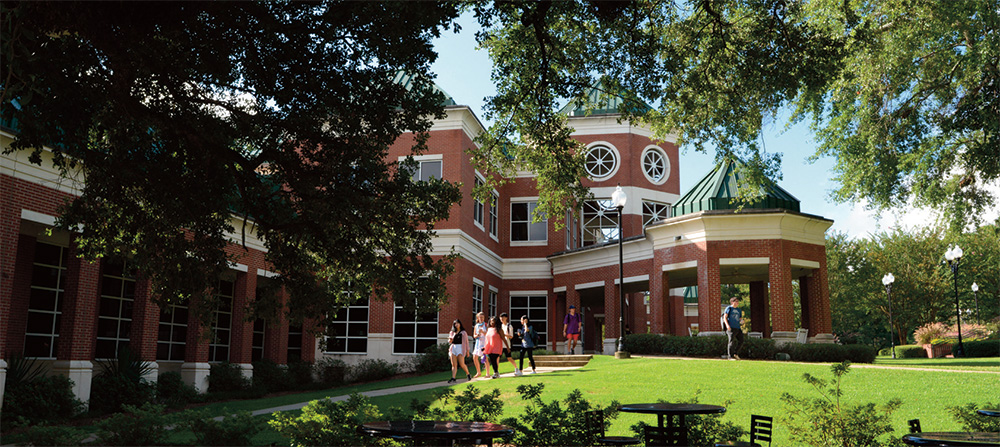
What makes Belhaven different?
When you look at the big flagship universities, they’re focused on the four S’s: size, sizzle, sports and status. (We focus on) character, curriculum, caring, and Christ, four C’s.
We (want) every student to grow in Christ, to be well prepared for the marketplace, and to have the kind of support especially that this generation needs in order to be successful.
Half of (professing evangelical) students who attend a state university will lose their faith before they graduate.
We can’t guarantee we’re going to have a specific outcome. But what I can guarantee is that they will have a biblical foundation in every class they take here, from a Christian faculty member who is here to serve them and to help them.
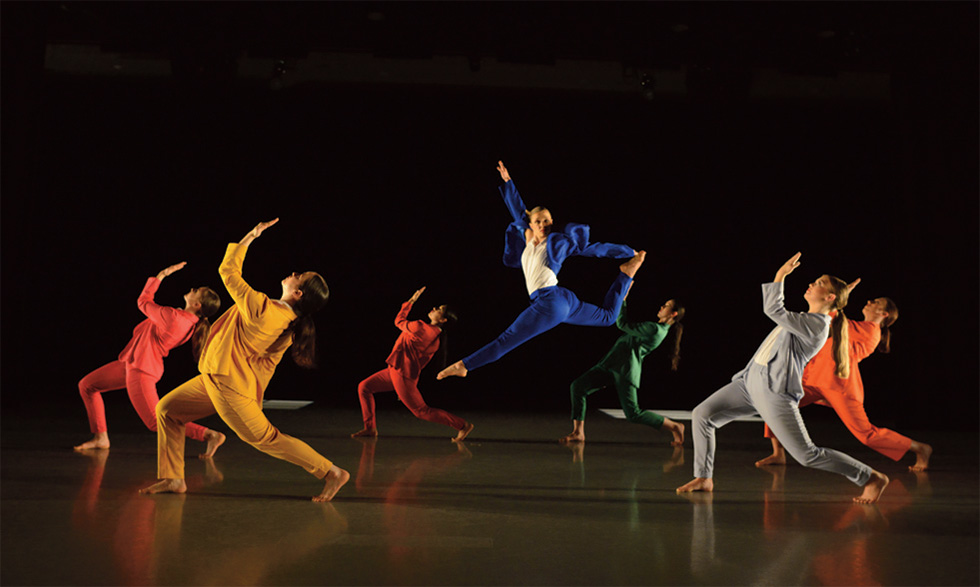
What he’s learned at Belhaven:
If you hire the right people, who have a calling and a passion for what they do, facilitate that and get out of their way, good things happen.
Create a culture with high levels of trust, stability and grace. … I think when you get that culture, it just allows people to grow in the Lord and grow in their service and further their call.
The impact of COVID:
Freshmen who are coming this week have not had a normal day of school since February their sophomore year (of high school).
I (also) think there’s an isolation that’s come with it that’s impacting our culture and our ability to build community.
The biggest fear I have is that we’ll try to hope it goes back how it was and get frustrated when it doesn’t. It’s not going back how it was.
(But) we have been a leader in online education for two decades. We have a great, strong program.
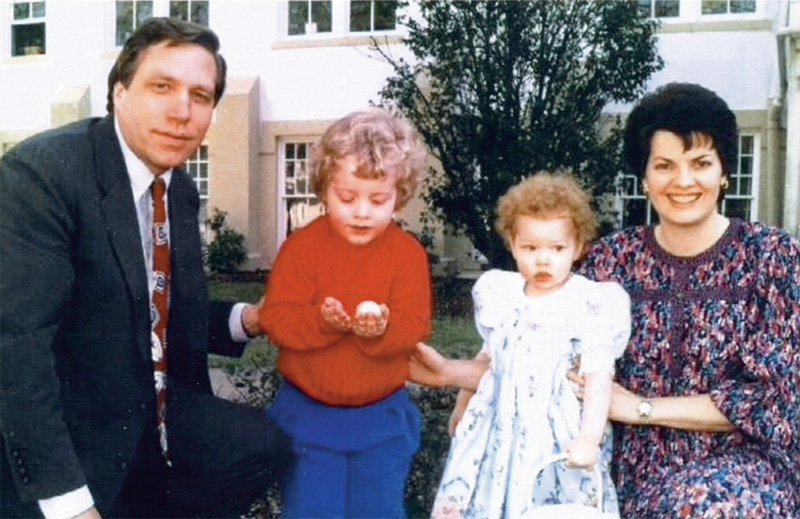
Dr. Parrott with his wife, MaryLou, and their kids, Grady and Madison, at Belhaven in 1996. Both Grady and Madison went on to graduate from Belhaven.
How Christian higher ed is changing:
We’re trying to be innovative to help students be prepared for a rapidly changing job market. They’ve got to be deeply rooted to stand up to the tests that are coming for this next generation. And they’ve got to have the flexibility to adjust to change.